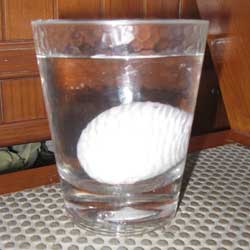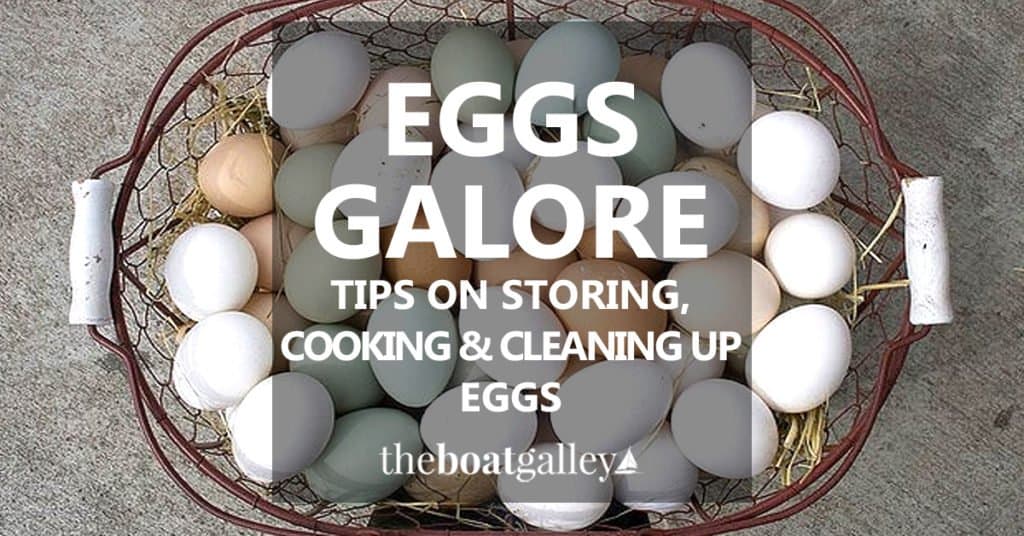Eggs were one of my first “cooking” lessons. While I don’t actually remember it, family lore says that when I was 2 or 3 years old, my mom was doing some baking and decided to show me how egg whites get fluffy when beaten. Since my only sibling, a brother, is 16 years older than I and in college at the time, the real story is probably that she was trying to keep me occupied while she was baking. She put a bowl on a coffee table where I could see it, separated the egg whites into it, and started up the electric mixer. Apparently, I watched in awe, my eyes getting bigger and bigger as the egg whites got bigger and bigger!
In the 50+ years since that day, I’ve continued to learn about using and storing eggs!
10 Tips for Storing and Using Eggs
1. Eggs only need to be refrigerated if they’ve already been refrigerated. Learn more about storing eggs in Reducing What You Store in the Refrigerator or Ice Box.

2. Two tests for determining if an egg is still good to use:
- Put the whole egg into a glass of fresh water. If the egg sinks and lies on its side, it’s “very fresh.” If it lies on an angle (as in the photo), it’s “fresh.” If it stands on end with one end on the bottom, it’s still good but should be used reasonably soon. And if it floats, it’s bad.
- The smell test is simple. Break the egg into a cup or small bowl. If it stinks (a nasty sulphur smell), it’s bad.
3. If you break an egg and notice that the sac encasing the yolk is disintegrating (which happens as it ages), it’s still fine to use the egg if it doesn’t stink. You can’t use it for a fried egg, but it’s fine for scrambling or using in baking.
4. Hate that green line around the yolk of hard-boiled eggs? It’s caused by the yolk getting too hot.
5. Once hard-boiled, eggs shouldn’t be kept more than a day without refrigeration. Cooking them changes the protein, I’m told. Of course, the “official” line is that eggs should never be kept unrefrigerated — raw or hard-boiled — so I can’t get confirmation on this.
6. Boiled eggs peel much more easily and neatly if you use older eggs. Using “very fresh” eggs almost guarantees they won’t peel nicely.
7. The more “done” a boiled egg is, the easier it is to peel. Starting with eggs that are equally fresh, a hard-boiled egg will be easier to peel than a soft-boiled one.
8. To boil eggs without cracking the shell, put the eggs into room temperature water, then bring the eggs and water to a boil. If you put a cold or room temperature egg into hot water, it’s almost certain to crack.
9. Want to make half a batch of a recipe calling for an odd number of eggs? Read how to have “half an egg.”
10. Another use for older eggs is when you’re beating eggs whites (although the yolk sac has to be intact so that you can separate the eggs). They’ll beat higher if older, and also if at room temperature. Add a little salt when you begin beating them to firm up the protein, then as they begin to foam up, add just a touch of an acid to stabilize the foam: cream of tartar is called for in most cookbooks but can be hard to find outside the US. You can substitute a few drops of lemon juice, lime juice or white vinegar per egg.
And one final tip from a reader: Kim on SY Tompa says: “The best way to shell a boiled egg? Put it into a tall glass add a little water, place your hand over the mouth of the glass and shake vigorously – hey presto the shell just comes away!”

Carolyn Shearlock has lived aboard full-time for 17 years, splitting her time between a Tayana 37 monohull and a Gemini 105 catamaran. She’s cruised over 14,000 miles, from Pacific Mexico and Central America to Florida and the Bahamas, gaining firsthand experience with the joys and challenges of life on the water.
Through The Boat Galley, Carolyn has helped thousands of people explore, prepare for, and enjoy life afloat. She shares her expertise as an instructor at Cruisers University, in leading boating publications, and through her bestselling book, The Boat Galley Cookbook. She is passionate about helping others embark on their liveaboard journey—making life on the water simpler, safer, and more enjoyable.
Simplify meal prep on board with proven strategies for provisioning, maximizing fridge space, and cooking delicious meals aboard your boat.











ben says
My background is to always refrigerate eggs. I’m an American, it’s what we do. But when I spent some time in The Philippines, most eggs come unrefrigerated.
There are a few things about which I’m fuzzy regarding storing eggs. First, WHY does a previously refrigerated egg have to stay refrigerated? I don’t see how that particular temperature situation affects how easily it can be contaminated. I would think warm eggs would be more vulnerable to contamination because they spend more time at a temperature in which salmonella can grow.
Second, is an old “inedible” egg harmful in itself if it’s not contaminated? or is it just that the proteins and sulfur compounds break down to make it nasty (but technically safe)? Being a single guy, I’ve eaten eggs that were way past their sell by date by a ridiculous margin with no ill effects, and no bad smells.
Also, the reason to refrigerate hard boiled eggs is because of the cracking shell problem. Cooking an egg too fast has catastrophic cracks, but any cooking can make small or invisible cracks. It’s too easy to have microscopic cracks that are big enough for Salmonella to get in through. After all, even “gentle” cooking is by definition a pretty violent process.
Carolyn Shearlock says
Hi Ben!
With regard to why a previously refrigerated egg needs to stay refrigerated, it has to do with the change in temperature somehow facilitating any bacteria on the shell moving into the egg and contaminating it.
As to an “inedible” egg, well . . . I’ve never even thought of trying to eat one once it got to the “small nasty” stage. I eat them all the time way, way past the “sell by” date with no problem, but if you crack a “floater” it’s going to smell nasty . . . and I just can’t imagine trying to eat it.
-C
Elly says
I used a lock & lock egg container once but after a few days found my eggs were moldy. I never used it again for storage and finally gave it away. I always store my eggs outside of my fridge in an plastic egg tray and make sure to buy non-refrigerated ones. I have been told turning them around every couple of days will keep them ‘fresh’ longer. I have kept eggs up to a month without having any bad ones, but only because I was in a remote area. I prefer to buy them fresh every week or so otherwise.
Carolyn Shearlock says
If eggs are at all damp when you put them in a Lock & Lock container, they can mold . . . and it can happen in really humid places. Friends living on the edge of a rainforest used a tiny drill bit and made an air hole in the bottom and top of each egg space — it’s no longer mess-proof but elimated the mold problem. I’ve actually known of only a few people who have had a problem with mold developing on the eggs.
Another help might be to wipe the outside of the eggs with a dilute bleach solution and then dry them before putting them in a container — that would kill any mold spores that might have gotten on them at the “egg factory” or in transit.
Steph Marsh says
When a chicken lays an egg it has a membrane around it which helps to protect it from bacteria. If the egg is washed that is removed. Similarly if an egg is refrigerated in a shop and then bought and carried home at ambient temperature, condensation forms on the shell of the egg. This removes the protective coating therefore the egg has to go back into the fridge to maintain freshness. If you can buy eggs that have never been refrigerated they will last longer than all others.
As a European it is normal to buy eggs from the shelf – I wouldn’t dream of buying them from the cooler. It is against European law to refrigerate eggs that are for sale.
Bev says
I’m glad you posted this apparently some people didn’t do well in school lol!
Cyndy says
one way to store unrefridgerated eggs is to wipe with a dilute bleach solution then coat lightly with mineral oil which restores the original “coating”. I have heard of unrefridgerated eggs being stored for up to 9 (yes, nine) months this way. I would still use the freshness test, of course, but this is a pioneer method that seems to work.
Anna says
I think I’m going to put Cyndy’s suggested method to the test, I have heard it before, but just now thought I should test this out. I live in a traditional house with refrideration, but I’m going to try this out with a carton of eggs and water check one egg each month. If this holds true it will be a great help once we move onto the boat.
Terry Kennedy says
Ahoy,
Perhaps, you should consider using “waterglass” (sodium silicate solution). You can purchase it from 16 oz bottles to 55 gallon drums. A 16 oz bottle will make a gallon of liquid (mix with water at a 1:9 ratio) and it costs around $9.00 USD. You boil up the water and let it cool then mix in the waterglass. Put eggs into your container (Those plastic wide mouth gallon containers that condiments come in work great) and pour in the waterglass to cover the eggs by about 2″. The eggs will last 9 months or longer! This method will allow you to store approximately 9 dozen eggs for 9 months at a cost of a dollar a dozen. Way cheaper than a cage of hens strapped to your gunnel… Cheers, Capt. Terry
Wendy Kall says
I was very excited to use the Lock n Lock egg containers for storing my large eggs. However, they molded in the unrefrigerated state. They literally had mold all over the outside. I did not use them but had to throw. I then decided I would have to use the Lock n Lock egg container in my frig to store eggs which defeated my purpose in getting the product. If I store outside without the lid, they will last fine but not on a passage, only at anchor. This was my experience.
Sailing with Totem says
Yes you can. I love eggs! Must not run out of eggs!
Reggie says
We have stored previously refrigerated refrigerated eggs for weeks unrefrigerated on our boat in Florida and the Bahamas. We have done this over several years when part time cruising. As I recall, i have only had three eggs go bad. Why have we done this? inability to find unrefrigerated eggs and not enough room in the frige for the dozens we buy.
-johnny says
I can’t find the article on this, but as I recall in the USA there is a law that forces egg producers to wash eggs before they can be sold. This washes off bacteria on the shell that can cause diseases if the shell comes in contact with the rest of the egg or ingredients or even the hands of the cook. This washing requires refrigeration to help the eggs to last longer. The rest of the world do not wash their eggs and thus do not need to keep them refrigerated, and they also don’t last as long.
Ernie Lorimer says
There was a recent article in the New York Times that explained this further. An egg is laid with a membrane which makes the shell less permeable to bacteria. As a way of preventing salmonella, US law requires egg producers to wash the eggs, which washes off the membrane. That in turn requires refrigeration for the eggs to keep.
In the EU, it is the opposite. It is against the law to wash an egg for sale, so as to keep the membrane intact. That in turn allows eggs to be sold without refrigeration.
Refrigerating and then not does have some effect, but what most people see is an effect, not a cause.
Steven Bibula says
I am a US-based farmer, and for years I have kept flocks of hundreds or thousands of laying hens.
When the hen is laying an egg, the last thing the she provides that egg is just a bit of mucus that dries on the shell, which does not seem to do much apart from lubricate the egg’s final passage through the cloaca and into the world. I don’t see how a little mucus becomes a membrane. It is just a final film of mucus (even though, as we know, the gray lady could not possibly misreport anything).
Back in the 1990’s, I was able to talk a PhD egg scientist, from Cornell University in NY, into spilling the beans about eggs and refrigeration. It seems that the requirement to refrigerate had nothing to do with washing, and had everything to do with a legacy of inadequate salmonella control in the large commercial laying facilities, for in the 1970s and 1980s, salmonella contamination was rampant, even into the inside of the egg; since they couldn’t wash the inside of the egg and they hadn’t yet figured out how to reign in salmonella, the industry conspired with government regulators (in typical crony fashion) to mandate refrigeration, which slows the multiplication of salmonella to dangerous levels within the egg.
He admitted that household refrigeration tends to be too cold (around 40f) and too dry for the egg. These drying cold conditions remove moisture from the egg, and the drying effect shrinks the inner membrane away from the shell, thus reducing the egg’s natural defense against bacterial invasion through the porous shell. This is a big reason that LONG-REFRIGERATED EGGS are better kept refrigerated. But this does not apply to eggs whose defenses have not been compromised by untoward storage conditions.
This egg scientist also grudgingly acknowledged that, apart from the salmonella problem, the ideal storage conditions for eggs is 50-55f and moderate humidity. These are the critical factors for normal fresh egg longevity.
I have tested that, and I have found that WASHED eggs with sound shells can be successfully stored at 50-55f and moderate humidity for four or five months or longer and remain good to eat. Perhaps, then, the decision to wash ought to be based on an evaluation of the cleanliness of the shell.
Carolyn Shearlock says
Thanks so much for this! I easily store once-refrigerated eggs for a month (often longer) when it’s 90-95 out.
Mary Roth says
My husband accidentally froze the eggs that were in our refrigerator while I was away from the boat. (refrigerator setting/fullness of refrigerator issue). He said he was able to fry them in their oval shape. Is there any information about freezing eggs and their usage with or without thawing?
Carolyn Shearlock says
I don’t have any but I know that you can crack them and freeze them, so I don’t see why freezing in the shell would really be a problem other than a weird shape.
-johnny says
This is a very easy to understand video about why some countries refrigerate eggs and others do not. I hope it is helpful. https://www.youtube.com/watch?v=Xbqv1SuQJ0s
-johnny
Sharon says
https://www.google.co.uk/amp/www.latimes.com/food/dailydish/la-dd-heres-why-we-need-to-refrigerate-eggs-20140714-story,amp.html May help with why and when to refrigerate eggs
Traci Lynn Martin says
I am planning a 3 month canoe trip and would like to include fresh eggs with my supplies. I saw a documentary that showed a man on a sail boat who had enough eggs to last for 6 months. He said by flipping the entire carton them over every week, the eggs never get a chance to settle and won’t spoil .
They were not refrigerated eggs.
Is that how I should store them and handle them on my trip?
Carolyn Shearlock says
Yes. And you can do it with refrigerated eggs for about a month.